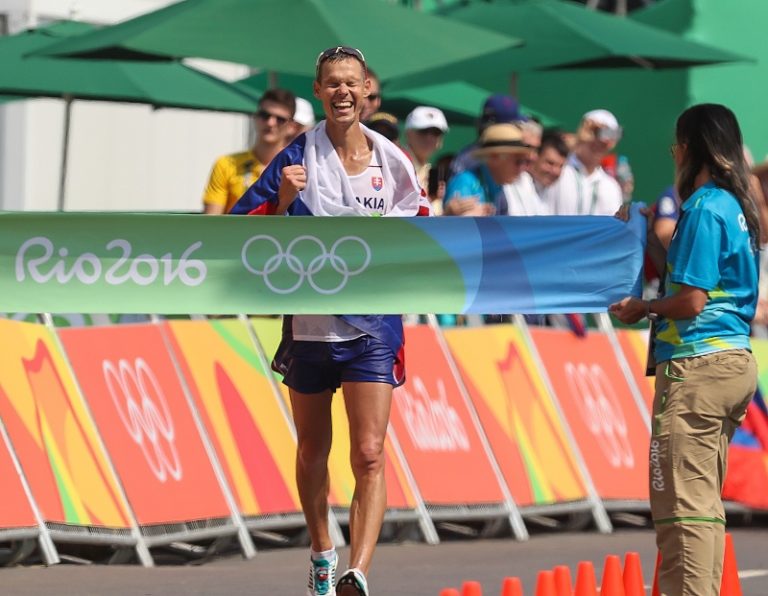
Recently I made an interview with the winner of the Olympic Gold in the 50km race walk – Matej Tóth. I admit I felt a considerable respect for a man who was able to fight for Slovakia the first most precious metal at the endlessly long track in Rio. At the end we not only talked about a professional sport but we also had a chat about his private life.
Mr. Tóth, first of all let me get back to the Summer Olympic Games where you pleased all of our country by winning the most precious metal. However, it is obvious there is a lot of sweat and effort behind each and every success. It applies for work, sport or even personal growth. That’s why I consider it appropriate to begin our interview with a question about your preparation – physical and psychical. According to motivation leaders it is important to prepare mind for victory in advance, to individual stages you would bring you there and of course how to celebrate it. Did your mind undergo anything like that? Did you get prepared for a victory in advance?
Not at all. Maybe it can be applied in certain sports but by 50km race walk you cannot be sure you are going for victory when you are just in the 40th kilometre. Self-confidence is definitely important but most of all it is a belief in your own strengths and your being conscious of what I have trained for, my feeling of being in a good shape and that I am going to do my best for success. Nevertheless should I have been set just for winning in Rio, I would have already given up after 20km and congratulated to Diniz for his victory. The same for Tallent after his attack on the 40th kilometre. Humility and fight for as best performance as possible is much more important by 50km than a motivating lesson.
While watching great successes of different sportsmen I don’t concentrate only on the result itself, I rather contemplate about what’s happening in their minds few minutes before the finish when they realize the end victory is coming but there are few hundreds or tens of metres missing in order this to happen. What was in your mind? Were you sure about your triumph, did you imagine a golden medal in your hands or were you just concentrating on your performance till the end?
I was concentrated for about 49.5km, feelings of satisfaction, enjoyment and euphoria exploded about 500m before the finish. Than I realized I was walking for a golden medal and the greatest success the sportsman can achieve. But I must admit I really cannot recall what was in my mind in that moment. I have spoken out this story for 100 times and when the same story is told the 101st time it becomes completely different story than that told the first time. Therefore my speaking about my immediate feelings cannot be as authentic as when I spoke about it the first time. However I am sure about how happy I felt, about my thoughts addressed to my closest ones and I remember the feeling of relief and satisfaction that I met my expectations as well as those of my entire nation.
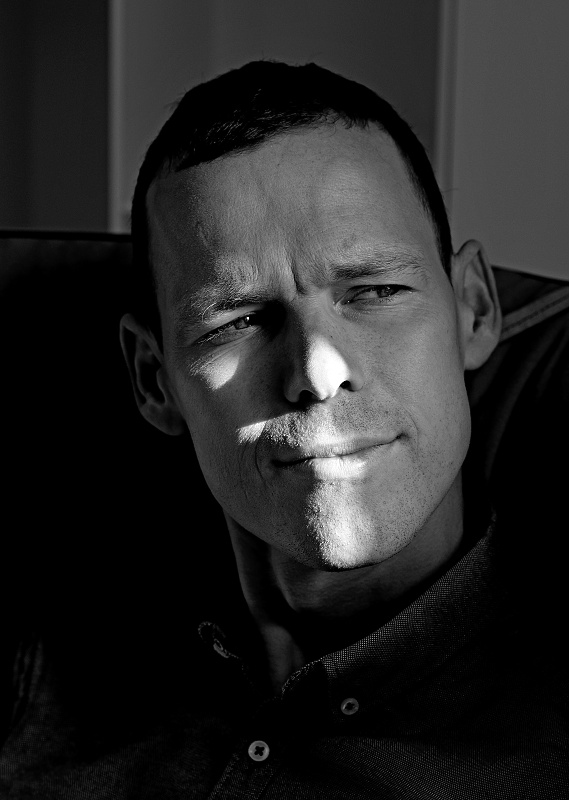
Achievements of sportsmen are permanently related with one word – the growth. In your case the progress has been great. At the Olympic Games in China you were ranked on the 26th place, four years later in London you were 5th and finally this year in Rio you won the gold. Besides that you are the World Champion of 2015. Where did you find strengths and motivation that led you to top?
You omitted to mention the 32nd place at my first Olympics in Athens. For me it is simply a natural process. I had never been a naturally great talent and all my achievements were based on my hard work and enormous support from all people around me. I was lucky to be positively influenced by circumstances as well as people helping me to find right direction in right time. Anyhow, I have never considered my less valuable achievements and successes to be disappointments. I have always put my best efforts while competing in any and all races and though I didn’t succeed I didn’t see it as a disappointing moment but rather like a motivation to my further growth and progress. Medals and fame have never been my motivation for trainings. My engine and power comes from my love to sport. Even after thousands of kilometres and years of training I like race walk and enjoy it. I am a lucky man because I’m doing what I like and at the same time I’m making money of it.
Athletics is said to be a Queen of the sport. Anyway there are various and attractive disciplines within this sport but you chose 20km and 50km race walk. Why did you decide for a race walk?
It was a “concurrence of circumstances” not a thoughtful act. When I was in the 2nd grade of the elementary school I attended a class for athletes. That time we tried all disciplines and because I was always better in endurance sports, I have been good in a race walk since beginning. I used to be 2nd or 3rd in the class so I started to participate in school races. Then my athletics trainer recommended me to cooperate with a trainer who specializes on race walk, Mr. Peter Mečiar and since he was a great motivator we took this sport seriously and it was him who graved the love to race walk into my heart.
Could you tell us something about your beginnings? Where the career of a future Olympic winner started to form? Have you ever considered other options like professional sport when you were facing to challenging moments of your sport life?
There was my parents’ upbringing and education that formed the firm base in me. Endurance athlete must be responsible, strong-minded, devoted, sticker and humble. My trainer Peter Mečiar was the one who transformed all of these features into my attitude to a sport. Before I started to cooperate with him I had absolutely no bond with race walk, but after one year of our cooperation I didn’t consider any other career than that of the professional athlete.
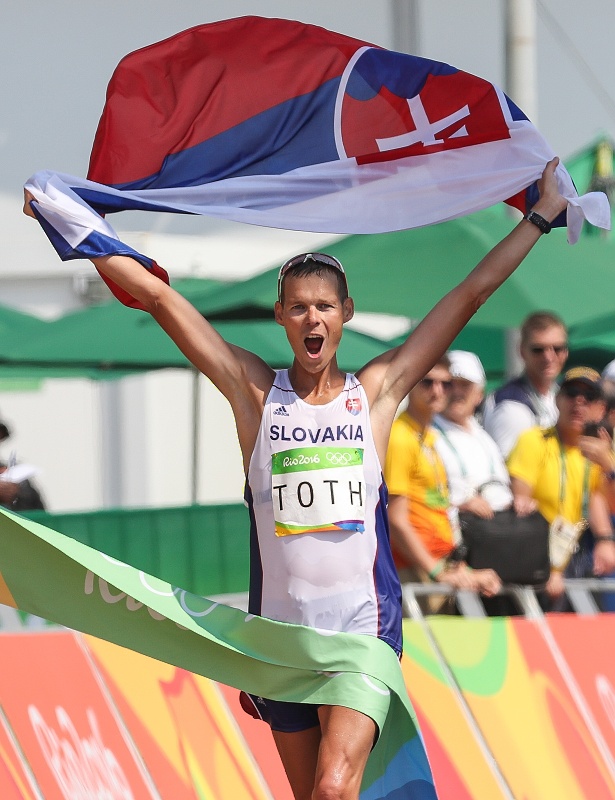
Let me now turn from sport to “common” matters. I read a very interesting information in your CV. You graduated in journalistic at the Faculty of Philosophy at the UKF Nitra (University of Constantine the Philosopher). Have you ever consider to take a pen and write when your career of a professional athlete will end?
Well I have been thinking about that constantly. I have got de facto a daily contact with journalists and media though I am on the other side of the microphone. I have also received offers to work for some media nevertheless in present time I am not able to afford being both a journalist as well as a professional sportsman. However, we’ll see what happens to me.
Many female fans are disappointed because you are married. Never mind it would be good to know how did you meet your wife Lenka. Was it on any sport meeting?
It was more down-to-earth although our first moments were connected with a funny word puzzle. Before I started to date Lenka, I had been “dating” her brother, my current brother-in-law … fortunately only on our joint trainings. He used to be my colleague and he introduced me to my future wife. First time we met during my concentration training in Sliezsky dom in 2001. That time there was no gleam of love between us but later, when I found out, Lenka was studying in Nitra too, I asked Peter to give me her phone number and we agreed to have our first date and after that it was a fast ride. Now we are already together for 13 years.
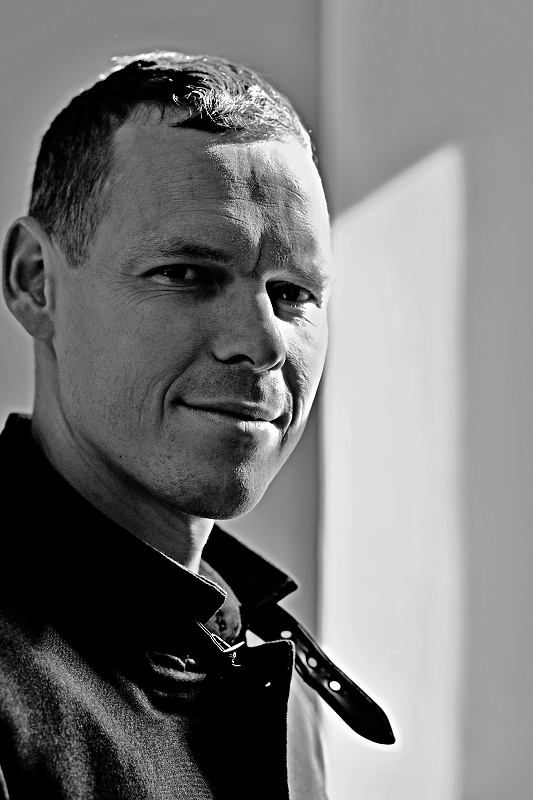
A sportsman’s world can seem to be boring. Mostly filled by hours of trainings, self-renunciation and energy invested only into one goal – to be successful in his or her discipline. Is the athlete’s life so boring? What are you doing when you are not in training or competing on races?
It is true that once you are a professional athlete you must be doing that 24/7. That means that I must think about impact common activities can have on my next hard training. I must adjust my nutrition habits, lifestyle as well as to go to bed in right time. But apart from trainings, exercises and regeneration I still have enough time for common human activities. I drive children to school, to their free time activities, I help my wife in household, cut the grass or was the car. However while being in concentration trainings our leisure time is also aimed at sporting – more trainings, more regeneration, more relax and minimum of issues out of sport. Most often just some book, crossword or movie…
Every man has his own tiny vices that can help him to be unblocked from a common life. Many successful men are keen of collecting quality wines or whiskey, they like smoking superb cigars, drive fast sport cars. What about your tiny vices? Can you reveal some of them?
Well, they are really tiny. Actually there is nothing I could deem to be my typical vice. All of my hobbies and vices are put aside when I am at home I try to give 100% of my free time to my family and to their wishes and interests. Anyway if there is few time left for me, I like browsing internet and watching news of automobile industry or electronics. And time to time I reward myself by some accessories for my car or some new electric toy.
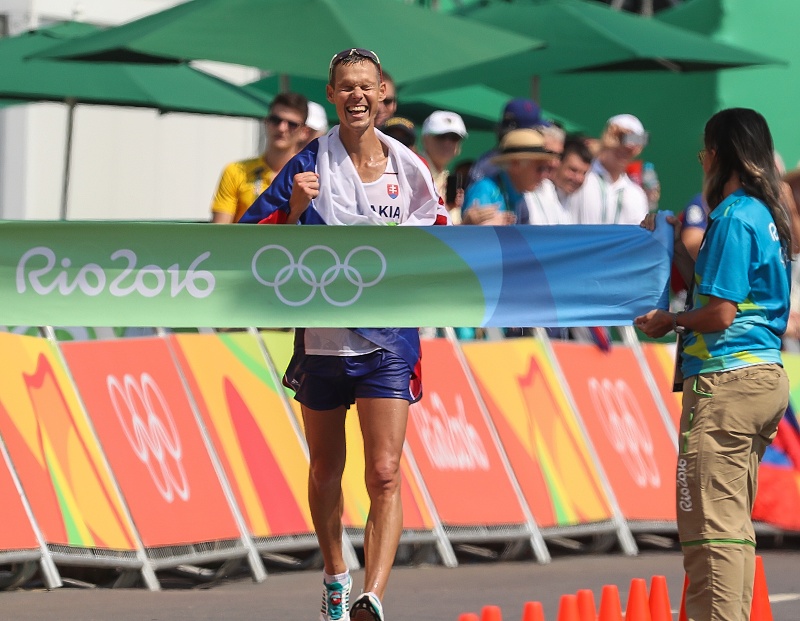
As an athlete you have visited many countries. Which one was the most interesting for you and why?
Definitely it is Slovakia. I really travel a lot but whatever country I am returning from almost every time I must admit how fine we are living in Slovakia and what a nice and peaceful country it is. Fingers on one hand are enough to count countries where the life could be better than here. Top country then is Australia. However neither this country I would change for Slovakia. Even in the most developed countries where the GDP or macroeconomic indicators are higher the life is much more hectic and stressful in their cities. For me literally – everywhere fine, at home the best. Just let’s treasure what we have. For instance pure and healthy water from a water tap is high above the standard almost all around the globe.
My last question relates to Rio. Before the Olympic games there were many articles published about the problems this city has got. What was your feeling about Rio, its atmosphere and people?
Rio succeeded to manage Olympic games from organizational perspective excellently. At the beginning there were few minor issues but these were caused mostly by their Southern temperament as they resolve the things only when “being in fire”. However apart from one incident there was nobody whose sport performance would have been negatively affected by the improper organization. Atmosphere on races and competitions was also great, spontaneous and vital. What I missed little bit was the similar atmosphere out of sporting places. It was quite lax though Rio has enormous energy, for me too much over limits, I had a feeling the city as a whole didn’t live with the Olympiad. It looked like 90% of citizens just kept living their own common lives with their own joys and worries. From this point of view it was worse than in London where you couldn’t find a person that was having indifferent relation to or wasn’t living with the Olympic games.
Peter Fritz
Photos: Paul Weber, Archive

